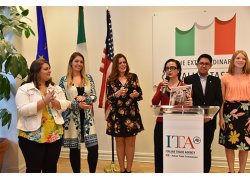Business Italian Style 2: Food Innovation, Sustainability and Made in Italy
Project Presented at the Festa della Repubblica at the Italian Trade Commission on June 2
Posted in: Inserra, Italian News and Events, World Languages and Cultures

Italian Studies at Montclair State University continues to welcome opportunities to link Italian language and culture to the business sector in dynamic ways in view of the launching of its combined Italian and Business BA in Fall 2018. Offering “Business Italian Style,” i.e. the Made in Italy interviews project, to our students again after its success three years ago (over 100,000 viewers learning about design, fashion, art, and food) seemed only natural. What better way to ask leaders in the field about doing business “Italian Style”? BIS2 offered the same formula — student-produced videos and articles about NJ-NY-based Italian entrepreneurs for the online newspaper La Voce di New York – but zoomed in on a very topical subject worldwide, in which Italy continues to be a front-runner: Food and Sustainability.
Developed within the ITA321 Business Italian course taught by Dr. Enza Antenos, the project involved three groups of students, each one dedicated to an Italian entrepreneur working in the States: Eataly USA’s Head Buyer Dino Borri, chef and TV star Lidia Bastianich and Andrea Illy, chairman of illycaffè and Altagamma Foundation. The three interviews, videos and articles were published on La Voce di New York. Read the articles (in English and Italian).
“The wealth of Italian businesses in the Tri-State area assists in establishing situated learning experiences for our students, where they are involved in cooperative activities and are challenged to use their critical thinking skills,” explained Dr. Antenos. “In this iteration of the Business Italian Style project with a focus on sustainability, students connected their prior knowledge about Italian food culture, and were challenged to develop a more thorough understanding of food, from the farm to the plate. In addition to honing language skills for specific purposes (interviewing business figures, discussing Made in Italy, expanding their knowledge of food production and preparation, etc.), the knowledge they acquired is applicable and transferable to their homes, communities and eventual workplaces.”
Along with Dr. Antenos, the former deputy editor of La Voce di New York Maurita Cardone, oversaw the actual interviews and their editing and subtitling. At the beginning of the project she gave an in-class lecture titled “Business and Food Made in Italy: Video-Interview, Goals and Strategies” in order to provide students with notions and methods of her profession. “It has been stimulating to see how engaged students became with this project,” Cardone said. “In this hands-on project, they were given the opportunity to meet the very protagonists of the story, and ask questions directly to the source. Being able to use the tools of journalism, they received precious insights on how Italian companies are integrating sustainability in their everyday business. I think the Inserra Chair created a unique opportunity not only for MSU students but also for Italian companies in the US to reflect on how the Made in Italy brand can communicate its values to the American public and start a conversation with a new audience.”
“A project like this one made possible thanks to the generosity of our main donor is opening up possibilities to undergraduate students in Italian that were unheard of in the past,” Inserra Chair Teresa Fiore added. “Meeting world-leading personalities in specific sectors thanks to the contacts provided by La Voce, and developing in-class projects involving the completion of articles and videos invites the students into a unique learning dimension. It’s not just the business content and language enrichment, whose importance remains central, but also aspects such as collaborative work at different levels of the process and time management.” Indeed, students learned that a project is the result of planning as part of sustained exchanges and of revising together despite the challenges posed by what for many was a new experience.
The class, taught entirely in Italian, was divided into groups that researched the topics to be covered as well as the person to be interviewed, wrote the questions, ran the interview, transcribed the audio, selected the sections of the footage for the video, developed the subtitles, and wrote the article. Oscar Guevara Perez, who was part of the Bastianich group, remarked on the double benefits of the project: “On the one hand, I was completely immersed in the Italian language because everything was in Italian. I learned a lot and it all made me want to learn even more. On the other hand, this project put me in direct contact with Italian culture. I experienced firsthand the Made in Italy and sustainability; I saw them “in action”; they were no longer ideas and values that happened only in Italy. Lidia Bastianich made it all real. Because of what I now know, I am more careful about the things I purchase and the food I eat. And I am also even more in love with Italy, Italians and Italian culture!”
Talia Antonacci, one of the students who interviewed Andrea Illy, considers herself very fortunate: she met and interviewed a really prominent personality in the Made in Italy sector, and applied what she learned in class to a real interview, and eventually to the accompanying video and article. As she commented: “Learning in depth about Slow Food, sustainability, and the Made in Italy brand’s importance has really caught my interest and throughout the semester I found myself sharing with friends and family about what I’ve learned. Best of all, my Italian vocabulary has expanded immensely by our use of the language to discuss Italian values and approaches; when you learn about a culture using the native language, the understanding is much more authentic.
After interviewing Dino Borri with her classmate, Christina Pari concluded: “I feel extremely lucky to have been a part of this project, and a student of this class, which made me pursue a minor in Business. It was certainly a wild ride, in its combination of journalism and business in Italian, but so incredibly worth it when considering how much it strengthened my language skills and allowed me to appreciate my own culture.
The BIS2 project was presented at the headquarters of the Italian Trade Commission in Manhattan, on occasion of a very successful celebration of the Italian culture and food on June 2, during the celebration of the National Day of the Republic of Italy. Dr. Fiore and Dr. Antenos presented the project, accompanied by students involved in each group conducting the interviews. A new summer internship with ITA was also launched.
For more information on the project, visit the official web page.
